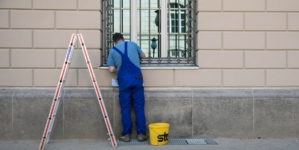-
Bunnie Xo defends sexy Scooby-Doo Velma costume amid social media hate - 14 mins ago
-
Bengals Considering Making Major Change After Loss to Lions - 35 mins ago
-
Joey Logano Advances After Denny Hamlin’s Move in Wild Last Lap at Charlotte - 42 mins ago
-
Cowboys Owner Jerry Jones Makes Obscene Gesture To Jets’ Fans During Win - about 1 hour ago
-
"They're not satisfied" – Daryl Johnston & Kevin Kugler on Lions' dominant win over Bengals - about 1 hour ago
-
Hundreds trapped by blizzard conditions on Mount Everest - 2 hours ago
-
California’s home insurer of last resort seeks 36% rate hike following January fires - 2 hours ago
-
How to Watch Pumas UNAM vs Guadalajara: Live Stream Liga MX, TV Channel - 2 hours ago
-
‘Shut down the Blue Jays’ offense’ – Derek Jeter on how Yankees can overcome 0-2 deficit in ALDS - 2 hours ago
-
Gaza ceasefire negotiations to resume amid new hope for peace deal - 2 hours ago
L.A. cookie shop owner sees profits crumble under tariff burden: “I have to find a way to persevere”
Los Angeles — Cookie connoisseur Lara Adekoya started her baking business during the pandemic, selling cookies to masked customers out of her Los Angeles home.
Now, customers flock to her L.A. bakery, Fleurs et Sel, to get their hands on flavors like oatmeal chocolate chip walnut, peanut butter and Nutella, and matcha dark chocolate.
Adekoya says she’s now paying $50 to $100 more per bag for premium ingredients imported from countries around the world, including France and Japan, due to President Trump’s tariffs.
She says that amounts to an extra $3,000 to $4,000 per month she is now spending on supplies.
Adekoya says she has not yet passed on that extra cost to her customers, absorbing the entirety of it herself.
“I guess the easy answer is like, raise your prices. I’m not at the point where I want to pass that on to my customers,” Adekoya told CBS News.
Two lower federal courts have ruled the Trump administration’s “reciprocal” tariffs, ranging from 15% to 50%, are illegal. The Trump administration has appealed the case to the Supreme Court.
Small businesses involved in the case say the impacts of tariffs are “not survivable.”
“Mom and pop shops, they don’t have the resources to absorb these high costs imposed by these tariffs,” said Brian Peck, executive director for the USC Center for Transnational Law and Business, and an adjunct assistant law professor who specializes in tariffs. “If these reciprocal tariffs are upheld by the Supreme Court, it gives the president unlimited authority to impose whatever tariffs he wants on different countries. It limits the choices you have in terms of trying to find alternative sources.”
Higher tariffs have forced Adekoya to delay expanding her business, and she’s had to limit the availability of cookies that require imported ingredients.
“I have those core flavors that I know I can get those ingredients. And then the specialty flavors, I can just throw them in and out based on being able to source them,” Adekoya explained. “I have to find a way to persevere. If I didn’t have that mindset when I started my business, I wouldn’t have gotten this far.”
Source link



























